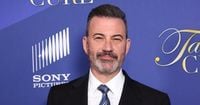Jimmy Kimmel Live! is back on television screens across the United States, following a dramatic week-long hiatus that thrust the late-night talk show into the center of national debates over free speech, media influence, and political pressure. On September 26, 2025, two of America's largest local TV station owners, Sinclair Broadcast Group and Nexstar Media Group, announced the reinstatement of the popular show on their ABC-affiliated stations, ending an embargo that had kept Kimmel off the air for more than a week. Their decisions followed ABC’s own move to lift its suspension of Kimmel after a storm of controversy erupted over his comments regarding the killing of conservative influencer Charlie Kirk.
The ban began earlier in September when Kimmel made remarks about the recent shooting of Charlie Kirk, a prominent conservative activist, at a university campus event in Utah. During his monologue, Kimmel appeared to link the shooter to supporters of former President Donald Trump. He said, "the US president and his allies were desperately trying to characterise this kid who murdered Charlie Kirk as anything other than one of them," and accused Trump and his supporters of attempting to "score political points from it." Kimmel then likened Trump’s reaction to Kirk’s murder to "how a four-year-old mourns a goldfish." These comments, aired on national television, quickly drew sharp criticism from conservative circles and led to a cascade of consequences.
Sinclair and Nexstar, which together own dozens of ABC-affiliated stations in major cities such as Washington DC, Nashville, New Orleans, and Seattle, responded by pulling Jimmy Kimmel Live! from their airwaves. According to reporting by BBC, this move came after Brendan Carr, the Trump-appointed chair of the Federal Communications Commission (FCC), threatened to revoke ABC’s broadcast license—a rare and serious warning that underscored the fraught relationship between media companies and government regulators. The network itself then suspended Kimmel, deepening the controversy and igniting a fierce national debate about the boundaries of free speech and the role of political influence in broadcasting.
Sinclair, in a press release announcing the end of its embargo, said it had received "thoughtful feedback from viewers, advertisers, and community leaders representing a wide range of perspectives." The company also cited a shooting at an ABC affiliate in Sacramento the previous week as a stark reminder of the importance of "responsible broadcasting" and "respectful dialogue between differing voices." Sinclair insisted that its decision to pull Kimmel’s show was "independent of any government interaction or influence," pushing back against the widespread perception that the company had acted in response to Carr’s threat. "It is simply inconsistent to champion free speech while demanding that broadcasters air specific content," Sinclair stated, defending its right as a broadcaster to determine its own programming.
Behind the scenes, both Sinclair and Nexstar engaged in ongoing and, by their accounts, "constructive" discussions with ABC and its parent company Disney. Sinclair said it had proposed measures to promote greater accountability, viewer feedback, and community dialogue—though none of these suggestions had yet been adopted by ABC or Disney at the time of the show's reinstatement. Nexstar, for its part, expressed appreciation for ABC’s "constructive approach to addressing our concerns" and reaffirmed its commitment to "protecting the First Amendment." Both companies ultimately decided to bring Jimmy Kimmel Live! back to their affiliates, restoring access to the show for millions of viewers across the country.
For Kimmel, the return to air was both a professional and personal reckoning. On September 23, 2025, he delivered a 28-minute monologue addressing the controversy head-on. "It was never my intention to make light of the murder of a young man," Kimmel said, expressing regret for the pain his comments may have caused. But he did not hold back in his criticism of what he described as "anti-American" threats to free speech, accusing the Trump administration of employing "mob tactics." In a pointed rebuke, Kimmel declared, "Our leader celebrates people losing their livelihoods because he can't take a joke." The monologue, which aired as the show returned to a partial audience (with about a quarter of ABC stations still not carrying it due to the ongoing embargo at the time), resonated with many viewers and ignited further debate about the limits of political humor and the responsibilities of public figures.
The audience response to Kimmel’s return was striking. According to BBC, viewership for the show more than quadrupled, even as some ABC affiliates continued to withhold the broadcast. This surge in ratings underscored the enduring popularity of late-night television as a forum for political commentary and cultural reflection—and highlighted the power that both national networks and local station owners wield in shaping the American media landscape. Networks like ABC depend on local affiliates to air their programming and generate advertising revenue, while local stations rely on compelling national content to draw audiences and keep viewers engaged. The tug-of-war between these interests was on full display throughout the Kimmel saga.
The controversy also exposed deep divisions within the country’s political and media ecosystems. Supporters of the show and advocates for free speech saw the embargo as a dangerous precedent, warning that political pressure on broadcasters threatened to chill open debate and artistic expression. Critics, including many on the right, argued that Kimmel’s remarks were insensitive and disrespectful, particularly in the wake of a tragic killing. Sinclair had initially demanded that Kimmel issue a direct apology to the Kirk family and make a "meaningful personal donation" to Kirk’s family and organization—demands that were not publicly met before the show’s return.
Former President Trump, never one to shy away from a media battle, weighed in on the controversy via social media on September 26, 2025. "I can't believe ABC Fake News gave Jimmy Kimmel his job back," he wrote, expressing disappointment with the network’s decision and fueling further debate among his supporters and detractors alike.
Amid all the back-and-forth, the events of the past week have served as a potent reminder of the complex interplay between media companies, government regulators, advertisers, and the viewing public. As Sinclair noted in its statement, "these events underscore why responsible broadcasting matters and why respectful dialogue between differing voices remains so important." Whether this episode will lead to lasting changes in how controversial content is handled—or simply fade into the annals of late-night television history—remains to be seen. For now, viewers across the country can once again tune in to Jimmy Kimmel Live! and judge for themselves.


